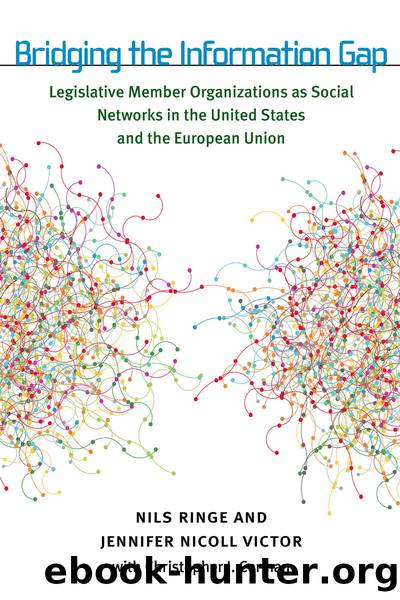Bridging the Information Gap by Unknown

Author:Unknown
Language: eng
Format: epub
ISBN: 9780472029211
Publisher: University of Michigan Press
Measuring Legislatorsâ Constraints
Having illustrated that many LMO ties do not replicate other institutional ties, we now continue to test our theoretical propositions about the bridging nature of LMO ties by examining whether LMO members connect pairs of colleagues who are not otherwise tied to one another. We rely on Burt's measure of constraint, which describes the extent to which a person's network is concentrated in redundant contacts (Burt 1992, chapter 2). The objective is to conduct paired t-tests to compare the constraint of LMO members and non-LMO members. Since a lower constraint score indicates that an actor connects more people who are not otherwise tied to each other, our first expectation is that the constraint scores of LMO members are statistically significantly lower than those of legislators who are not members of any LMOs. In other words, members of LMOs connect more fellow legislators who are not already connected to one another than do lawmakers who are not members of any LMOs.
Next, we compare the constraint scores of LMO members to their constraint scores in the absence of their LMO membership. We expect that LMO members connect more fellow legislators who are not otherwise connected to each other than they would if they were not members of any LMOsâthat is, LMO membership (statistically significantly) decreases individual legislatorsâ constraint scores.
At first glance, these hypotheses may read like truisms. After all, one would expect that any ego with a greater number of LMO or other social ties is more likely to link otherwise disconnected alters and therefore have a relatively lower constraint score. Finding confirmation for our hypotheses would thus not be surprising. With regard to our second hypothesis in particular, this raises the question of whether comparing networks including LMO ties to networks without LMO ties considers the relevant counterfactual. Perhaps a more appropriate point of comparison would be a counterfactual network with a randomly distributed set of simulated LMO ties.
We maintain that our expectations and comparisons directly follow from our theoretical story. To start, our hypotheses reflect our principal argument about the value of weak, bridging LMO ties: they facilitate the flow of information in the legislative arena by connecting (subsets of) legislators who would not be connected to each other in their absence. A counterfactual in which LMO ties are absent is thus the appropriate point of comparison against which to evaluate our propositions. In contrast, a comparison to a counterfactual network including a set of randomly distributed simulated LMO ties would only follow logically from our theoretical propositions if we argued that legislators joined LMOs in a conscious effort to affect the number of bridging ties in their ego networks. If we maintained, for example, that lawmakers joined LMOs in an effort to increase the number of bridging ties in their ego networks, we should indeed expect to find greater bridgingness in the LMO network than in a random counterfactual.
This is not what we argue, however. Our theory highlights weak and bridging LMO ties as an informational benefit, not as their raison d'être.
Download
This site does not store any files on its server. We only index and link to content provided by other sites. Please contact the content providers to delete copyright contents if any and email us, we'll remove relevant links or contents immediately.
| Grief & Bereavement | Hospice Care |
| Pet Loss | Suicide |
They Both Die at the End by Adam Silvera(9818)
Thirteen Reasons Why by Jay Asher(8909)
The Space Between by Michelle L. Teichman(6939)
Suicide Notes by Michael Thomas Ford(4827)
Tuesdays with Morrie by Mitch Albom(4784)
Suicide: A Study in Sociology by Emile Durkheim(3022)
The Checklist Manifesto by Atul Gawande(2852)
Tuesdays With Morrie by Mitch Albom(2761)
In the Woods by Tana French(2598)
Bossypants by Tina Fey(2531)
Robin by Dave Itzkoff(2440)
Olive Kitteridge by Elizabeth Strout(2370)
No Ashes in the Fire by Darnell L Moore(2333)
Reservoir 13 by Jon McGregor(2302)
End of Days by Sylvia Browne(2187)
All Things New by John Eldredge(2161)
Bus on Jaffa Road by Mike Kelly(2159)
Scar Tissue by Anthony Kiedis(2135)
No Time to Say Goodbye(2116)
